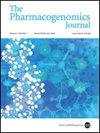HLA-B*07:02 和 HLA-C*07:02 与三甲双胍-磺胺甲噁唑呼吸衰竭有关
IF 2.9
3区 医学
Q2 GENETICS & HEREDITY
引用次数: 4
摘要
我们在以前健康的儿童和年轻人中发现了一种未得到充分认识的严重药物不良反应(ADR),即三甲氧苄氨嘧啶-磺胺甲噁唑(TMP-SMX)导致的呼吸衰竭。我们在一组 7 名患者中调查了与 TMP-SMX 引起的呼吸衰竭相关的潜在遗传风险因素。我们分两个阶段研究了七名患者的全基因组序列,这七名患者占全球所有报告病例的近一半,我们还研究了 63 名无亲属关系的对照个体:(1) 人类白细胞抗原(HLA)位点变异,因为其他几种 ADR 与 HLA 基因变异有关;(2) 编码变异,以编目和研究导致这种破坏性反应的潜在罕见变异。所有病例都是常见的 HLA-B*07:02-HLA-C*07:02 单倍型的杂合子(携带者)或同型。尽管样本量较小,但与已报道的最大人群频率(HLA-B 的二项式 P = 0.00017,HLA-C 的二项式 P = 0.00028)和采用相同 HLA 基因分型方法评估的对照人群(HLA-B 的二项式 P = 0.000001,HLA-C 的二项式 P = 0.000018)相比,这一观察结果具有统计学意义。基因组中其他地方的基因没有利用共同的罕见病例富集编码变异。我们的研究结果表明,HLA-B*07:02 和 HLA-C*07:02 是 TMP-SMX 导致患者呼吸衰竭的必要条件。本文章由计算机程序翻译,如有差异,请以英文原文为准。

HLA-B*07:02 and HLA-C*07:02 are associated with trimethoprim-sulfamethoxazole respiratory failure
We have identified an underrecognized severe adverse drug reaction (ADR) of trimethoprim-sulfamethoxazole (TMP-SMX) associated respiratory failure in previously healthy children and young adults. We investigated potential genetic risk factors associated with TMP-SMX induced respiratory failure in a cohort of seven patients. We explored whole genome sequence among seven patients representing nearly half of all reported cases worldwide and 63 unrelated control individuals in two stages: (1) human leukocyte antigen (HLA) locus variation as several other ADRs have been associated HLA genetic variants and (2) coding variation to catalog and explore potential rare variants contributing to this devastating reaction. All cases were either heterozygous (carriers) or homozygous for the common HLA-B*07:02–HLA-C*07:02 haplotype. Despite the small sample size, this observation is statistically significant both in conservative comparison to maximum reported population frequencies (binomial P = 0.00017 for HLA-B and P = 0.00028 for HLA-C) and to our control population assessed by same HLA genotyping approach (binomial P = 0.000001 for HLA-B and P = 0.000018 for HLA-C). No gene elsewhere in the genome harnessed shared rare case enriched coding variation. Our results suggests that HLA-B*07:02 and HLA-C*07:02 are necessary for a patient to develop respiratory failure due to TMP-SMX.
求助全文
通过发布文献求助,成功后即可免费获取论文全文。
去求助
来源期刊

Pharmacogenomics Journal
医学-药学
CiteScore
7.20
自引率
0.00%
发文量
35
审稿时长
6-12 weeks
期刊介绍:
The Pharmacogenomics Journal is a print and electronic journal, which is dedicated to the rapid publication of original research on pharmacogenomics and its clinical applications.
Key areas of coverage include:
Personalized medicine
Effects of genetic variability on drug toxicity and efficacy
Identification and functional characterization of polymorphisms relevant to drug action
Pharmacodynamic and pharmacokinetic variations and drug efficacy
Integration of new developments in the genome project and proteomics into clinical medicine, pharmacology, and therapeutics
Clinical applications of genomic science
Identification of novel genomic targets for drug development
Potential benefits of pharmacogenomics.
 求助内容:
求助内容: 应助结果提醒方式:
应助结果提醒方式:


